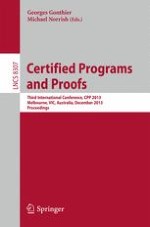2013 | Buch
Certified Programs and Proofs
Third International Conference, CPP 2013, Melbourne, VIC, Australia, December 11-13, 2013, Proceedings
herausgegeben von: Georges Gonthier, Michael Norrish
Verlag: Springer International Publishing
Buchreihe : Lecture Notes in Computer Science
